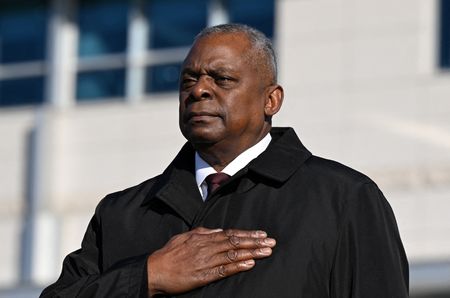By Idrees Ali and Phil Stewart
WASHINGTON (Reuters) – U.S. Defense Secretary Lloyd Austin on Wednesday said the United States would not back down from supporting Ukraine in the short and long-term, even as President Joe Biden’s administration has run out of money for Kyiv and a request for additional funds is languishing in the Republican-controlled House of Representatives.
“We will continue to dig deep to provide Ukraine with both short-term and long-term support,” Austin said virtually, without mentioning the $95.34 billion military aid package for Ukraine and other allies that has not been taken up yet by the House Speaker Mike Johnson.
Austin was speaking virtually from his house after he was forced to cancel a planned trip to Brussels for the NATO meeting because he was hospitalized to address a bladder issue.
Austin’s comments come at a critical moment for Ukraine and questions about U.S. commitment to Europe.
Ukraine’s leadership sees the funding as crucial as it continues to fight an invasion launched by Russian President Vladimir Putin nearly two years ago.
While Austin did not address the lack of funding and the House of Representatives, others have.
British Foreign Secretary David Cameron on Wednesday urged U.S. lawmakers to vote for the security aid package.
“I urge members of Congress in the United States who will be looking at this today to vote for the package,” Cameron told reporters during a visit to Bulgaria.
Biden has been pushing for the package, which also includes security funding for Israel and Taiwan and humanitarian aid for Palestinians, for months. He has faced opposition from Republican hardliners, particularly those most closely aligned with former President Donald Trump.
Backers of the aid have been warily watching Trump’s reaction. He has criticized the aid on social media, saying it should take the form of a loan, and also worried U.S. allies by suggesting he could encourage aggression against some NATO members.
Trump, in recent days, has drawn scorn from Biden and top western officials after he suggested the United States might not protect NATO allies who aren’t spending enough on defence from a potential Russian invasion.
(Reporting by Idrees Ali and Phil Stewart; Editing by Chizu Nomiyama)
